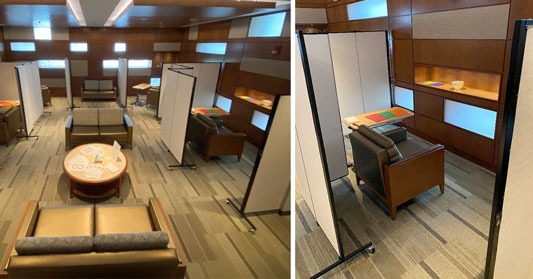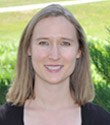Jul 01, 2020
Pennsylvania Hospital Transitions HRSA-Funded Program to Online Services and Addresses COVID-19 Stress
by Allee Mead
 When Cindy Esser
of Butler, Pennsylvania, was writing a grant proposal for
the Rural Health Care Services Outreach Program in early
2018, she could not have predicted that a global pandemic
would create the need to alter her hospital's way of
doing business midway through the grant cycle.
When Cindy Esser
of Butler, Pennsylvania, was writing a grant proposal for
the Rural Health Care Services Outreach Program in early
2018, she could not have predicted that a global pandemic
would create the need to alter her hospital's way of
doing business midway through the grant cycle.
Butler Memorial Hospital was awarded the Outreach Program grant from the Health Resources and Services Administration (HRSA) Federal Office of Rural Health Policy (FORHP). It named the newly funded program the Regional Alliance Chronic Disease Coordination and Management (RACDCM) Program. The RACDCM Program, which serves rural Butler, Clarion, Indiana, and Jefferson counties, has 15 consortium members, including hospitals, physician practices, home care, and Area Agencies on Aging.
The RACDCM Program follows patients as they transition between units of care, such as inpatient to skilled nursing facility to home care. The program also helps patients access chronic disease management resources such as lifestyle coaches and connects them to social services and community resources.
"We're hoping to enable patients to improve their self-care, get to their physician appointments, have healthy food, and be able to really utilize the resources to help them better manage their own care as a chronic disease patient and improve their outcomes," said Esser, BSN, MHA, MBA, Director of Emerging Technologies.
Esser coordinated the grant writing and now acts as an advisor to the RACDCM Program. She said that the program is filling a need since Butler Memorial Hospital's service area has a high prevalence of chronic disease compared to the Pennsylvania state average, along with lower incomes and limited access to care.
The target population for the RACDCM Program is adults 45 years or older who have at least two chronic diseases, including obesity, heart failure, diabetes, ischemic heart disease, chronic obstructive pulmonary disease (COPD), and hypertension.
Program enrollees receive a wide range of assistance provided by a lifestyle coach, a social worker, and designated support groups. Lifestyle coach and dietitian Patti Kuniak, RD, LDN, teaches one-time seminars on topics like heart-healthy lifestyles, plant-based eating, and the Mediterranean diet in addition to four-week series on weight management, diabetes, and now a self-care class.
Kuniak said that Butler Memorial Hospital is looking into expanding the weight management program from four weeks to 12 weeks, with an introductory class every four weeks so that people have more than one opportunity to join the program.
Pivoting the RACDCM Program Due to COVID-19
When the COVID-19 pandemic hit, Butler Memorial Hospital had to change how it provided the RACDCM Program. The biggest change was setting up the RACDCM staff to work from home and switching patients' in-person sessions and visits to telehealth. Stewart credited the quick transition to the hospital's prior telehealth experience, gained through its previous award of the HRSA Outreach Program grant for 2015-2018.
For us to be able to connect with our patients virtually, either through classes or provider visits, gave our patients that calmness and that confidence that we were there for them even in this unknown environment.
Esser said, "For us to be able to connect with our patients virtually, either through classes or provider visits, gave our patients that calmness and that confidence that we were there for them even in this unknown environment."
The lifestyle coaching classes for RACDCM participants are now offered online. This format will extend into December 2020 — since Butler Memorial Hospital's programming is scheduled in six-month increments — and may take a hybrid online/in-person form when the pandemic is over. In addition, Kuniak hopes to record some classes so that participants can access these videos on their own schedules.
Kuniak said the all-online format allows her to more easily use videos in the sessions and take viewers directly to websites with healthy recipes. In addition, sending out electronic handouts is cheaper than printing them. The biggest downside Kuniak reported for all-online classes is not being able to share healthy food with participants.
I've been very impressed with the number of older people who are attending [lifestyle coaching classes online] and have become technologically savvy enough to do this.
Kuniak was concerned that her older participants would struggle with the technology but, she said, "I've been very impressed with the number of older people who are attending and have become technologically savvy enough to do this." She speculated that, "because they're being forced to do it, to see their friends, to see their family, to go to church," they've quickly learned how to transition to online formats. For people without adequate internet access — a concern across rural America — Butler Memorial Hospital is working on adding dial-in options so participants can listen to sessions over the phone.
For online classes, Kuniak recommended "address[ing] the elephant in the room": even if the session is not specifically about COVID-19, give participants a space to talk about the pandemic and the ways it's affected their lives.
Pre-COVID-19, most RACDCM participants enrolled as a result of hospital discharge conversations. Since hospital staff wanted to reduce hospitalizations for non-COVID-19 cases, the RACDCM team focused on current program participants. The team worked diligently to provide resources and support so patients could remain safely at home and out of the hospital. As a result of their efforts, Stewart said, Butler Memorial Hospital reported a decrease in overall hospitalizations, including patients with chronic diseases like COPD and heart failure.
Kuniak added that the hospital was able to completely transition how it marketed its RACDCM Program, from previously using TV screens in waiting rooms and receiving physician referrals via fax to now recruiting participants through the Butler Memorial Hospital website and educating its partners about its services so they can refer their clients. Kuniak reported an increase in participation for her online classes since this marketing switch took place.
Other COVID-19 Initiatives in the Community
The changes to the RACDCM Program were part of a larger effort at Butler Memorial Hospital to respond to the COVID-19 pandemic. The hospital also created a Self-Care 4-Week Series for community members, including RACDCM participants. The series has four 30-minute sessions called Stress Less, Move More, Eat Right, and Sleep Well, all of which incorporate the latest research about that module's topic.
Of course, it's not just patients with chronic diseases who are worried about COVID-19. Healthcare employees are also in need of stress relief. In addition to the self-care class open to community members, Butler Memorial Hospital converted its chapel into a Self-Care Area for hospital employees and volunteers.
A palliative care physician identified a need for employees to take a few minutes for themselves, so the chapel is divided into private spaces where people can try stress reduction activities like meditation, coloring, and therapeutic writing. Erin Stewart, RN, Care Coordination Grant Manager, said she hopes the self-care space continues after the pandemic is over.

To reach employees working from home, Butler Memorial Hospital palliative care social workers pitched an idea for a Virtual Workforce Support Group for healthcare employees, an idea that they heard was working in another healthcare system. The support group sessions were offered at varying times four days a week and ended mid-June. Participants shared their concerns and fears regarding COVID-19 and the challenges of working from home. While the support group was not part of the grant funding, the lessons learned through the HRSA grant helped to inform Butler Memorial Hospital's role in creating a new opportunity and conducting the sessions.
For patients who were admitted to the hospital when visitors were not allowed, Butler Memorial Hospital created a "compassion round" that allowed patients to use tablets to connect with their loved ones.
Food insecurity has also been an issue, both for patients with chronic diseases who need access to healthy foods and for other community members who are struggling to afford food during the pandemic. To address this need, Butler Memorial Hospital worked closely with the Alliance for Nonprofit Resources and the Greater Pittsburgh Community Food Bank to support food distribution events by supplying volunteers and marketing.
At these distribution events, the hospital also marketed Kuniak's lifestyle coaching classes. The hospital promoted the distribution events to their employees as well, so care managers and social workers could let their clients know.
Our community has been extremely grateful for the food distribution events.
At the first food distribution event in March 2020, organizers anticipated 500 cars; however, the event ended up attracting about 1,000 cars, backing up traffic and resulting in people being turned away. After this clearly needed food distribution event, subsequent events were moved to a local fairground to accommodate more people. "Our community has been extremely grateful for the food distribution events," Stewart said.
Lessons Learned
Of course, pivoting a program during a pandemic is not without its difficulties. One challenge Stewart reported was keeping all employees up to date on the changing policies and keeping patients informed as services reopened. But Esser and Stewart said flexibility, collaboration, and communication were key to making the transition.
Esser advised reaching out to and learning from other organizations, especially those doing work that differs from yours. Stewart added it's important to work across departments within your healthcare facility. She also praised Esser for working to bring in services like telehealth before the pandemic hit, which helped Butler Memorial Hospital transition to online services more quickly.
Esser credited the team's work with "this FORHP grant focusing on the chronic disease population and being flexible in allowing us to change the way we do things in this environment. This grant's going to help us be more successful with managing these patients post-COVID."

